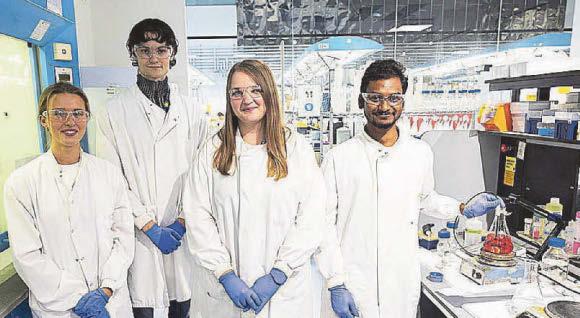Essayer OR - Gratuit
We won't stop until we find à cure for Alzheimer's
Daily Mirror UK
|October 30, 2025
I differentiate between the dad in my head and the one in front of me. It'd be almost funny if it wasn't so tragic

Mum-of-two Hayley with her father Tony
Pioneering doctors working on the front line of research into dementia have hope there will be a cure in our lifetime, thanks to their groundbreaking studies.
Fawlty Towers legend Prunella Scales, who died this week, was one of the nearly one million people in the UK affected by dementia, with Alzheimer's disease being the biggest cause.
But it is not a normal part of ageing, despite its prevalence in the elderly population, something neuroscientist Dr Cara Croft is keen to stress.
A scientist at the Queen Mary University of London's Blizard Institute, she is working relentlessly to find effective treatments.
She says: "Dementia and the diseases that cause dementia are a massive problem to society. At one point, I was thinking of becoming a clinical doctor, but I didn't want to say to patients, 'Sorry, you've got a disease that causes dementia but there's not really anything we can do for you'.
"Going down the science route instead, I feel that we can make waves and not have patients worry they only have so many more years left of normality.
"I wouldn't be researching Alzheimer's if I didn't believe we can find treatments to slow, cure or prevent this disease in our lifetimes."
Cara and her team - PhD students Miranda Colman, Daniel Birtles and Gabriela Da Cruz Meda, and lab technicians Abhiram Chakka and Mia Bovis - have been awarded five years of funding by the Alzheimer's Society to test 10 drugs that could lead to a cure for dementia.
They are working on brain slice cultures - growing human skin cells into miniature "brains" inside incubators, then using specialist equipment to monitor a protein called tau that is essential for the structural stability of their nerve cells.
Cette histoire est tirée de l'édition October 30, 2025 de Daily Mirror UK.
Abonnez-vous à Magzter GOLD pour accéder à des milliers d'histoires premium sélectionnées et à plus de 9 000 magazines et journaux.
Déjà abonné ? Se connecter
PLUS D'HISTOIRES DE Daily Mirror UK

Daily Mirror UK
Greenland of the free
KEIR Starmer and European leaders have issued a firm hands-off warning to Donald Trump over Greenland.
3 mins
January 07, 2026
Daily Mirror UK
A hol lot of value
Bulgaria tops list for bargain short-haul breaks this summer
1 mins
January 07, 2026
Daily Mirror UK
Alright our kid...we've been expecting you
Noel: I'd be great Bond villain
1 mins
January 07, 2026

Daily Mirror UK
PROBE ON PREM ACE RACE ABUSE
Cops & Meta act after Willock is targeted over missed shot
1 min
January 07, 2026

Daily Mirror UK
HE'LL BE ALRIGHT, JACKS
Bethell is backing team-mate Will to bounce back after a terrible blunder
2 mins
January 07, 2026

Daily Mirror UK
Time to tick up a penguin
HUMBOLDT penguins form an orderly huddle so they can be counted by their keeper.
1 min
January 07, 2026

Daily Mirror UK
NYE inferno bar had last safety checks 5 years ago
Foam soundproof panels analysed over blaze link
2 mins
January 07, 2026
Daily Mirror UK
DRIVE TO SAFETY
Radical overhaul of car laws in bid to cut crashes and save lives
1 min
January 07, 2026
Daily Mirror UK
Vic is Juan to watch
UNAI EMERY called ex-Manchester United star Juan Mata to get the lowdown on his old team-mate Victor Lindelof before signing the Swedish defender or a free transfer.
1 min
January 07, 2026

Daily Mirror UK
The Goretti outdoors
Big freeze could get worse
2 mins
January 07, 2026
Listen
Translate
Change font size
